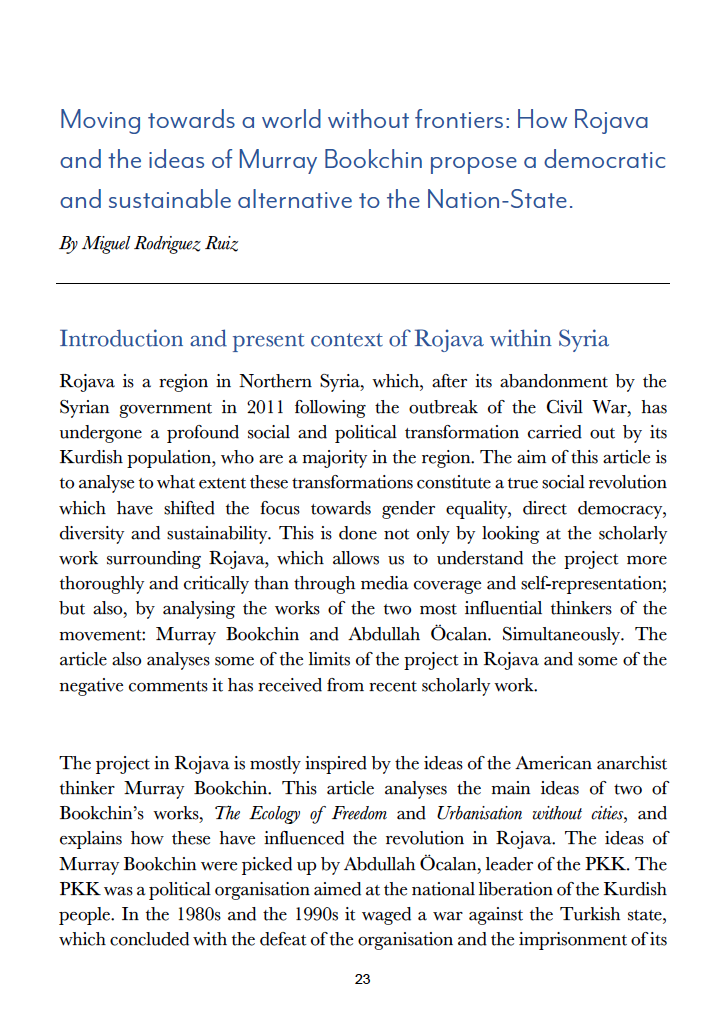Moving towards a world without frontiers
How Rojava and the ideas of Murray Bookchin propose a democratic and sustainable alternative to the Nation-State
DOI:
https://doi.org/10.36399/GroundingsUG.12.158Keywords:
Rojava, Syria, Nation-building, Bookchin, Öcalan, KurdishAbstract
Rojava is a region in Northern Syria, which, after its abandonment by the Syrian government in 2011 following the outbreak of the Civil War, has undergone a profound social and political transformation carried out by its Kurdish population, who are a majority in the region. The aim of this article is to analyse to what extent these transformations constitute a true social revolution which have shifted the focus towards gender equality, direct democracy, diversity and sustainability. This is done not only by looking at the scholarly work surrounding Rojava, which allows us to understand the project more thoroughly and critically than through media coverage and self-representation; but also, by analysing the works of the two most influential thinkers of the movement: Murray Bookchin and Abdullah Öcalan. Simultaneously. The article also analyses some of the limits of the project in Rojava and some of the negative comments it has received from recent scholarly work.
References
Biehl J. (2012) ‘Bookchin, Öcalan and the Dialectics of Democracy’ New Compass Press, 16th of February, Accessed 26th December 2018.
Biehl J. (2016) ‘Thought on Rojava: an interview with Janet Biehl’ interviewed by Zanyar Omrani, Roar Magazine, 13th of January.
Bookchin M. (1982) The Ecology of Freedom: The Emergence and Dissolution of Hierarchy, 2nd edn., Black Rose Books, Montreal, Quebec.
Bookchin, M. (1992) Urbanisation without cities, Black Rose Books, Montreal, Quebec.
Cemgil C. and Hoffman C., (2016) ‘The 'Rojava Revolution' in Syrian Kurdistan: A Model of Development for the Middle East?’, Institute of Development Studies, Vol 47, No 3, pp. 53-77.
De Jong A. (2016) ‘The New-Old PKK’, Jacobin, Accessed on the 29th of December 2018.
Engel Di Mauro, S. (2015) ‘Rojava’, Capitalism Nature Socialism, 26:1, 1-15.
Ensor, J. (2018) ‘Syrian Kurds request help from Assad regime after US abandons them’, The Telegraph, Accessed on the 28th of December 2018.
Hall R. (2018) “‘We used to trust the US’: Syrian Kurds fear Turkish attack after Trump’s troop withdrawal”, Independent, Accessed on the 28th of December 2018.
Hunt S.E. (2017) Prospects for Kurdish Ecology Initiatives in Syria and Turkey: Democratic Confederalism and Social Ecology, Capitalism Nature Socialism pp. 1-20.
Khalaf R. (2016) Governing Rojava: Layers of legitimacy in Syria, Chatham House.
Lebsky M. (2016) ‘The economy of Rojava’, Cooperation in Mesopotamia, accessed on the 27th of December 2018.
Leezenberg M. (2016) The ambiguities of democratic autonomy: the Kurdish movement in Turkey and Rojava, Southeast European and Black Sea Studies, 16:4, 671-690.
Öcalan A. (2011) Democratic Confederalism, 1st edition, International Initiative, Cologne.
Şimşek B. & Jongerden J. (2018): ‘Gender Revolution in Rojava: The Voices beyond Tabloid Geopolitics’, Geopolitics, pp.1-22.
Syrian Democratic Council (2016), Social Contract of the Democratic Federation of Northern Syria Rojava.
System D media, (2015), Rojava: An economic system in progress, Available at: https://www.youtube.com/watch?v=a_dchu1i8cs, Accessed on the 28th of December 2018.
Tisdall S. (2018) ‘Trump’s Syria move pleases dictators and hands initiative to ISIS’, The Guardian, Accessed on 2nd of January 2019.
Tokar B. (2008) ‘On Bookchin's Social Ecology and its Contributions to Social Movements’, Capitalism Nature Socialism, 19:1, 51-66.

Downloads
Published
Issue
Section
License
Copyright (c) 2019 Miguel Rodriguez Ruiz

This work is licensed under a Creative Commons Attribution 4.0 International License.
The CC BY 4.0 license is a Creative Commons license. This is a non-copyleft free license that is good for art and entertainment works, and educational works. It is compatible with all versions of the GNU GPL; however, like all CC licenses, it should not be used on software. People are free to: Share — copy and redistribute the material in any medium or format; Adapt — remix, transform, and build upon the material for any purpose, even commercially. The licensor cannot revoke these freedoms as long as you follow the license terms. But they must conform to the following terms: Attribution — You must give appropriate credit, provide a link to the license, and indicate if changes were made. You may do so in any reasonable manner, but not in any way that suggests the licensor endorses you or your use. No additional restrictions — You may not apply legal terms or technological measures that legally restrict others from doing anything the license permits.
Please check individual article PDF copies to see if any additional restrictions apply.







